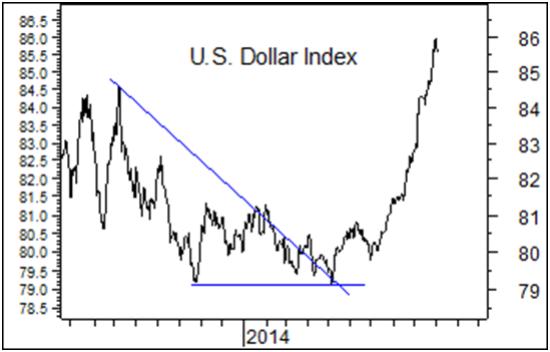The dollar is on a tear. And the world is scrambling to figure out what it means.

Beginning with the always-interesting Martin Armstrong in a recent Financial Sense interview:
“I know a lot of people that hate the dollar, but you have to understand the dollar is really only the game in town. Yes, we have a big debt but that debt is absorbed by central banks just having to hold reserves. They’re holding it in U.S. government debt. You can’t hold debt of Greece. Debt of Germany just went negative…France is in trouble as well as Spain and Italy…
You go to New York and it’s all foreigners buying the top-end real estate; same thing in Florida. China is the number one buyer of the highest priced real estate in the U.S. Canada is the number one buyer of real estate as far as the number of properties…
So, this is the trend as war develops more in the Middle East and also in Europe and Asia. Capital has no place to go but the United States and this is going to push the U.S. dollar up higher…â€
Another positive take comes from Monty Guild, also on Financial Sense:
Investors, Pay Attention: Causes and Implications of U.S. Dollar Strength
A rising U.S. Dollar has benefits, including higher demand for U.S. Treasuries, lower borrowing costs for the Federal government, foreign demand for U.S. assets (including stocks), lower commodity prices, and especially lower oil prices, which will hurt Russia and benefit the U.S consumer by lowering the cost of gasoline.
Overall, until any negative effects begin to manifest, a stronger Dollar suggests money will continue to be attracted to the U.S. stock market, especially stocks whose sales are primarily domestic, and not international, and particularly for large-cap stocks. This has already begun; larger companies have been outperforming small- and mid-cap companies since early summer. Investors should focus on large U.S. companies that do not get a major share of their profits from abroad. Stocks of companies that sell globally will see their foreign earnings somewhat diminished by a lower value of their foreign currency sales in U.S. dollar terms.

